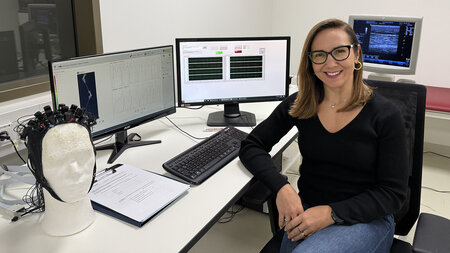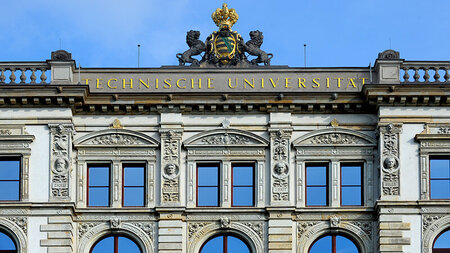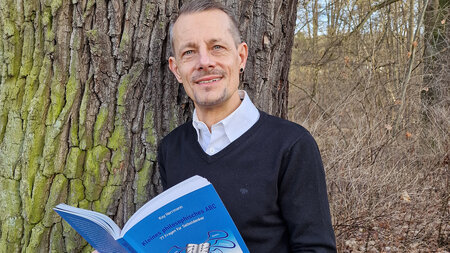Team, External Researchers & Adjunct Lecturers
Dr. Anja Herrmann-Fankhänel

Forschungs-, Transfer- und internationale Projekte
- 2024 QuaSiSocI - Qualitätssicherung für Soziale Innovationen in Sachsen
- 2023 ReFoSocI - Regionale Fokusgruppen für Soziale Innovationen in Sachsen
- 2023 Freie Kunst und Kultur in Chemnitz & die Kulturstrategie 2030
- 2021-2023 Value Capital Innovation
- 2021 Kulturgesichter Chemnitz Wortmeldungen
- 2021 Sozial.Innovativ.Sächsisch.
- 2017-2021 JointExpertise
- 2019-2020 ARTEM OCC 2020
- 2023 ReFoSocI - Regionale Fokusgruppen für Soziale Innovationen in Sachsen
- Herrmann-Fankhänel, A. (2025): Quality Assessment of Social Innovations. NAMA/PROD VHB Conference Chemnitz 24.-25.09.2025
- Herrmann-Fankhänel, A. & Hüsig, S. (2025): Understanding 'Sharingness': Strategic Implications for Entrepreneurs in the Sharing Economy Ecosystem. IECER Reykjavik, Island 12.-14.09.2025
- Müller, J. & Herrmann-Fankhänel (2025): Gut Feeling Meets Sustainability: Developing a Framework for Business Angel Investment Decisions. IECER Reykjavik, Island 12.-14.09.2025
- Herrmann-Fankhaenel, A., Hahn, C., Radke, L., Herzer, P., Rudolph, S., Meischner-Eschborn, S., & Kressner, T. (2024). Social Innovation Report 2024—Soziale Innovationen im Freistaat Sachsen.
- Herrmann-Fankhänel, A (2025): Quality Assurance of Social Innovations. ARTEM OCC, Berlin 26.-28.03.2025
- Herrmann-Fankhänel, A (2025): Early Phases of Social Innovation Processes. ARTEM OCC, Berlin 26.-28.03.2025
- Herrmann-Fankhaenel, A. (2024): The international Sharing Economy in South Africa: Serving the Privileged but hardly the Poor. British Academy of Management, Nottingham, England. 2nd-6th of September 2024.
- Herrmann-Fankhaenel, A. (2024): Social Innovation beyond Social Entrepreneurship, 16th International Social Innovation Research Conference, Bern, Switzerland. 2nd-4th of September 2024.
- Herrmann-Fankhänel, A. & Lay-Kumar, J. (2023): Sustainable Finance in Deutschland Ist-Zustand und Rahmenbedingungen. Working Papers of the Chair for Innovation Research and Technology Management (BWL IX), TU Chemnitz. Version 14-1. 05.11.2023
- Herrmann-Fankhaenel, A. (2023): The Social Innovations Process of Social Service Organizations. 5th ARTEM OCC SYMPOSIUM, Durban, South Africa 7th-8th September 2023.
- Herrmann-Fankhaenel, A. and K. Akbar (2023): The international Sharing Economy in South Africa: Serving the Privileged but hardly the Poor. 5th ARTEM OCC SYMPOSIUM, Durban, South Africa 7th-8th September 2023.
- Herrmann-Fankhaenel, A. and S. Huesig (2023) "Business Patterns and Reverse Innovation Cycles in the Sharing Economy," 2023 Portland International Conference on Management of Engineering and Technology (PICMET), Monterrey, Mexico.
- Herrmann-Fankhaenel, A. (2023) "The Process of Social Innovations in Social Service Organizations," 2023 Portland International Conference on Management of Engineering and Technology (PICMET), Monterrey, Mexico.
- Herrmann-Fankhänel, A. (2023). The Social Innovation Process of Small and Medium-Sized Social Service Organizations. RnD Management Conference, 19-21 June 2023, Sevilla, Spain
- Herrmann-Fankhänel, A. (2023). Utilization of Online Platforms by Social Entrepreneurs for Social Sustainable Development. In Research Anthology on Approaches to Social and Sustainable Entrepreneurship (pp. 235–257). IGI Global. https://doi.org/10.4018/978-1-6684-7593-5.ch012
- Herrmann-Fankhänel, A., & Heinbucher, D. (2022). Cultural and Creative Industries under Corona Circumstance in Chemnitz. In Artem organizational creativity and sustainability—International conference—Book of abstract
- Frenz, R., & Herrmann-Fankhänel, A. (2022). Covid-19 as a Chance for Ideation? How Online Workshops Compare to Traditional Face-to-Face Idea Generation Workshops. In Artem organizational creativity and sustainability—International conference—Book of abstract
- Herrmann-Fankhänel, A. & Hüsig, S. (2022). Development and Factors of Survival of (New) Business Ideas in the Online Sharing Economy. PICMET Portland International Conference on Management of Engineering and Technology (PICMET). Portland, Oregon.
- Herrmann-Fankhänel, A. (2022). Eine Fallstudie zum Innovationssystem für soziale Innovationen in Sachsen. Working Papers of the Chair for Innovation Research and Technology Management (BWL IX), TU Chemnitz. Version 13-1. 22.04.2022
- Herrmann-Fankhänel, A. (2022). Perceiving Sustainability: A Workshop Concept for Creating Awareness and Building Knowledge About Sustainable Development. In Achieving Sustainability Using Creativity, Innovation, and Education: A Multidisciplinary Approach (pp. 173-196). IGI Global.
- Herrmann-Fankhaenel, A. & Schell, E. (2022): Sharing offline and for idealistic purposes in Germany. International Journal of Technology Management. (pp.270-293).
- Erne Schell & Anja Herrmann-Fankhänel (2021): The overlooked part of the Sharing Economy that really is idealistic and widespread: Offline Sharing Models in Germany; Sharing Cultures: 7th International Workshop on the Sharing Economy, Barcelona
- Liebold, S., & Herrmann-Fankhaenel, A. (2020): Stadt mit zukunftsträchtigen Ideen zur Nachhaltigkeit – Chemnitzer Ansätze für verbrauchsarme Lebenswelt in einem interdisziplinären Seminar untersucht. CWE-Dialog, 03/2020. https://www.tu-chemnitz.de/wirtschaft/vwl2/cwg/
- Herrmann-Fankhaenel, Anja, and Stefan Huesig (2020): An Empirical Based View on the Sharing Economy in Germany: More Mainstream Economy than Collaborative Commons? International Journal of Innovation and Technology Management. https://www.worldscientific.com/doi/abs/10.1142/S0219877020500315
- Herrmann-Fankhaenel, Anja; Breßler, Julia (2020): Interactive workshop: Global Sustainable Development. 3rd ARTEM Organizational Creativity and Sustainability International Conference, 19.-21.03.2020, Chemnitz, Book of Abstracts, ARTEM OCC 2020 Edition, pp. 250-253.
- Herrmann-Fankhaenel, Anja; Lindl, Titus (2020): Research Project: Leadership in Growing Organizations. 3rd ARTEM Organizational Creativity and Sustainability International Conference, 19.-21.03.2020, Chemnitz, Book of Abstracts, ARTEM OCC 2020 Edition, pp. 78-80.
- Herrmann-Fankhaenel, Anja; Hohmuth, Silke (2020): Female Business // Innovation ”Fearless Girls”. 3rd ARTEM Organizational Creativity and Sustainability International Conference, 19.-21.03.2020, Chemnitz, Book of Abstracts, ARTEM OCC 2020 Edition, pp. 361-364.
- Schell, Erne; Herrmann-Fankhaenel, Anja (2020): A conceptualization of idealistic and capitalistic sharing models as partial organizations - A Delineation by the example of Germany. 3rd ARTEM Organizational Creativity and Sustainability International Conference, 19.-21.03.2020, Chemnitz, Book of Abstracts, ARTEM OCC 2020 Edition, pp. 120-123.
- Frenz, Rebecca, Herrmann-Fankhaenel, Anja; Tarekegne, Jonas (2020): Gamification & Ideation - An empirical Analysis. 3rd ARTEM Organizational Creativity and Sustainability International Conference, 19.-21.03.2020, Chemnitz, Book of Abstracts, ARTEM OCC 2020 Edition, pp. 59-62.
- Herrmann-Fankhaenel, A. (2020). The sharing economy in Germany and Vietnam-is it internationally uniform?. International Journal of Internet and Enterprise Management, 9(3), 214-247.
- Frenz, R., Bucher, J., & Hermann-Fankhänel, A. (2019). Is an Artist a Better Scientist?: An Empirical Analysis on the Impact That Artistic Activity Has on a Scientist's Achievement. In Imagination, Creativity, and Responsible Management in the Fourth Industrial Revolution (pp. 102-125). IGI Global.
- Dressler, A & Herrmann-Fankhänel, A. (2019): Analyzing the SDGs and their 169 Targets: On the Way from Uncovering Misinterpretations to a Realistic Consideration of Practical Feasibility. EURAM Conference, Lisbon
- Herrmann-Fankhänel, A. (2019). Utilization of Online Platforms by Social Entrepreneurs for Social Sustainable Development. In Strategic Marketing for Social Enterprises in Developing Nations (pp. 75-102). IGI Global.
- Herrmann-Fankhänel, A; Hüsig, S.; Doanova, T. (2019): 12. AAE Summer and Winter School – Verantwortliches und nachhaltiges Management von Innovationen im urbanen und globalen Kontext bringt Studierende, Doktoranden und Professoren zusammen, CWG-Dialog, 1, 8-10.
- Herrmann-Fankhänel, A. (2019): How to take Advantage of Online Platforms like the Sharing Economy does. In: Moritz, M., & Wulfsberg, J. P. (Eds.). (2018). Co-Creation: Reshaping Business and Society in the Era of Bottom-up Economics. Springer.
- Herrmann-Fankhänel, A. (2018): An international perspective on Sharing Economy: Impact of online laptforms in Germany and South Africa. Business Management Conference 23.-24-08.2018 in Durban
- Herrmann-Fankhänel, A. (2018): Does the Sharing Economy evolve ideal characteristics for doing businesses on online platforms? 5th International Workshop on the Sharing Economy. 28.-29.06.2018 in Mannheim
- Herrmann-Fankhänel, A. & Akbar, K. (2018): An international perspective on Sharing Economy: The impact of online platforms in Germany and South Africa. 5th International Workshop on the Sharing Economy. 28.-29.06.2018 in Mannheim
- Herrmann-Fankhänel, A. (2018): Die Sharing Economy als Bestandteil der Wertschöpfung des Wirtschaftsstandortes Deutschland. In: Redlich T., Moritz M., Wulfsberg J. (eds) Interdisziplinäre Perspektiven zur Zukunft der Wertschöpfung. Springer Gabler, Wiesbaden.
- Herrmann-Fankhänel, A. (2017): A portray of the Sharing Economy in Germany and the possible contribution to social sustainability, Drittes i-share Symposium 08.-09.11.2017 in Mannheim.
- Herrmann-Fankhänel, A. (2017): Social Sustainability through Sharing Economy? Dynamics and Embeddedness of the Sharing Economy in Germany, 2nd ARTEM Organizational Creativity and Sustainability International Conference, 14.-16.09.2017, Nancy, Frankreich.
- Herrmann-Fankhänel, A. (2016): Auswirkungen der Sharing Economy auf die Wertschöpfung des Wirtschaftsstandortes Deutschland: Eine Untersuchung der Innovationen und Veränderungsprozesse auf den Ebenen der Volkswirtschaft, der Unternehmungen und der Individuen. 1. interdisziplinäre Konferenz zur Zukunft der Wertschöpfung, Hamburg.
- Herrmann-Fankhänel, A. & Hüsig, S. (2016): How much social innovation is behind the online platforms of the sharing economy?: An exploratory investigation and educing of clusters in the German context. Portland International Conference on Management of Engineering and Technology (PICMET). Hawaii.
- Online und Offline Sharing Economy
- Überleben und Sterben in der Sharing Economy
- Ländervergleiche zur Sharing Economy
- Geschäftsmodelle der Sharing Economy
- Creative Industries
- Innovationssystem
- Innovationen im Bereich Non-Profit-Organisationen
- Social Innovation und Catalytic Innovation
- Solidarische und alternative Wirtschaftskonzepte
- Ökonomische Nachhaltigkeit und Sustainable Finance
- Social Entrepreneurship und Shared Value Konzepte
- Social Franchise
- Female Entrepreneurship
- Catalytic Innovation sind die disruptiven Innovationen für soziale Problemlagen (Christensen et al, 2006). In der Disruptionsliteratur werden bereits die Herausforderungen im Zusammenhang mit Regulation, und wie mit diesen ggf. umgangen werden können, beschrieben (Huesig, et al 2014 & 2018). Hinsichtlich Catalytic Innovation gibt es kaum Untersuchungen über regulative Herausforderungen bei der Verbesserung bzw. Veränderungen sozialer Praktiken und Services. Gerade in Deutschland ist dies aber ein wesentlicher „non-market Factor“, weil soziale Arbeit und gesellschaftliche Bedarfslagen wie Wohnungslosigkeit, Migration, Pflege und Teilhabe für Menschen mit körperlichen und geistigen Besonderheiten gesetzlich geregelt sind (Herrmann-Fankhaenel, 2022). Daher sind auch die sozialen Hilfsangebote wie Beratung, Betreuung, Ausbildung usw. klar definiert und reglementiert. Welche Aspekte können also ggf. aus der Disruptionsliteratur auf catalytic Innovation transferiert werden und wie lassen sich auf dieser Grundlage Catalytic Innovation zukünftig zielführend vorbereiten und ausgestalten?
- Wie gestaltet sich aktuell der Beratermarkt für kleinere und mittlere NPO? - Eine Branchenanalyse des Beratermarktes für (kleine) Gemeinnützigkeitsorganisationen
- Individueller Bildungserfolg im Kontext des Bildungsumfelds und Implikationen für die Innovationsfähigkeit in Organisationen mit der Forschungsfrage: „Inwiefern kann ein Matching zwischen individuellem Lerntyp und Lernprozess und dem Bildungsweg nach der Hochschulreife zur Innovationsfähigkeit zukünftiger Mitarbeitenden und deren (Bildungs-)Karriere beitragen?“
- Teilnahme am 8. Lindauer Nobelpreisträgertreffen der Wirtschaftswissenschaften im August 2025 nach Auswahl durch die Faklutät für Wirtschaftswissenschaften der TU Chemnitz und das Lindauer Nobelpreisträgertreffenkommitee
- Universitätspreis der TU Chemnitz für die Dissertation "Sharing Economy - Innovations in Economy and Society enabled by Digital Technology (2023)
- Brad W. Hosler Outstanding Student Paper Honorable Mention from Portland International Center for Management of Engineering and Technology (PICMET) (2016)
- Vorlesung und Übung Innovation und Beratung, WiSe
- Vorlesung und Übung Grundlagen Management and Entrepreneurship, SoSe
- Seminar Innovationsforschung, SoSe
- Berufsfeldstudie/-projekt für Bachelor Wirtschaftsingenieurwesen und Wirtschaftswissenschaften, WiSe
- Anwendungsprojekt Qualität Sozialer Innovationen 2 2025-2026
- Anwendungsprojekt Qualität Sozialer Innovationen 1 2024-2025
- Anwendungsprojekt Innovationsmanagement zwischen Intra- und Entrepreneurship – Am Beispiel einer Plattform zum Wissensaustausch von Spinlab Leipzig & Bitroad 2023-2024
- Anwendungsprojekt Gemeinschaftliches Wohnen als Zukunftslösung in Europa 2022-2023 gemeinsam mit bring together
- Anwendungsprojekt Kultur@Corona 2021-2022
- Anwendungsprojekt Hubs und Labs in Sachsen als Förderer von (Social) Entrepreneurship 2021-2022
- Anwendungsprojekt Mercedes Benz – Kraftverkehr Chemnitz goes Science! 2020-2021
- Anwendungsprojekt The Next Generation! – the next MOSi? II 2020-2021
- Anwendungsprojekt Conference Inspired Art 2019-2020
- Anwendungsprojekt Wachstums- und Internationalisierungsstrategie für die Digitalisierung von Beratung 2019-2020
- Anwendungsprojekt Disruptives Potenzial von Blockchain-Technologien 2019-2020
- Anwendungsprojekt The Sustainable Manager 2018-2019
- Anwendungsprojekt Online and Offline Sharing Economy 2018-2019
- Anwendungsprojekt Transdisciplinary and intercultural Innovation for sustainable development 2017-2018
- Anwendungsprojekte Tutorium
- AAE Summer School 2025, Chemnitz & Berlin
- AAE Summer School 2023, Durban, Südafrika
- AAE Summer School 2022, Nancy, Frankreich
- AAE Summer School 2020, Chemnitz, Deutschland
- AAE Summer School 2018, Durban, Südafrika
- AAE Summer School 2017, Nancy, Frankreich
- AAE Summer School 2016, Durban, Südafrika
- Wissenschaftliche Mitarbeiterin der Professur Innovationsforschung und Technologiemanagement, seit April 2017 für Lehre, Forschung und Projekte
- Tutorin der Professur Innovationsforschung und Technologiemanagement für MOS-Anwendungsprojekte, Oktober 2016 - März 2017
- Wissenschaftliche Hilfskraft der Professur Innovationsforschung und Technologiemanagement für AAE Summer School, April 2016 - September 2016
- Tutorin der AG Soziale Kompetenzen, TU Chemnitz , April 2016 - März 2017
- Elternzeit 2015-2016
- Studium der Wirtschaftswissenschaften mit dem Masterabschluss im Bereich Management and Organization Studies, TU Chemnitz, 2011-2014
- Projektmitarbeiterin für Projekte zu (Re-)Integration in den Arbeitsmarkt von Langzeitarbeitslosen, Alleinerziehenden und Menschen mit Migrationshintergrund, Chemnitz 2010-2014
- Projektmitarbeiterin Großveranstaltungen, Chemnitz 2009-2010
- Diplom-Studium Veranstaltungs-, Sport- und Marketingmanagement an der Berufsakademie Riesa, 2005-2008
- Ausbildung Tourismusassistentin inkl. Auslandsaufenthalte Sri Lanka und Korsika, Chemnitz, 2003-2005
- Stellvertretende dezentrale Gleichstellungsbeauftragte der Fakultät für Wirtschaftwissenschaften von April 2022 bis März 2025
- Dezentrale Gleichstellungsbeauftragte der Fakultät für Wirtschaftwissenschaften Januar 2020-März 2022
- Stellvertretende dezentrale Gleichstellungsbeauftragte der Fakultät für Wirtschaftwissenschaften April 2018-Dezember 2019






